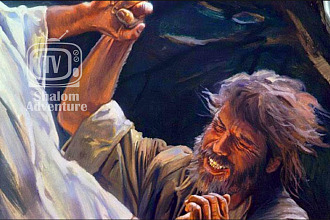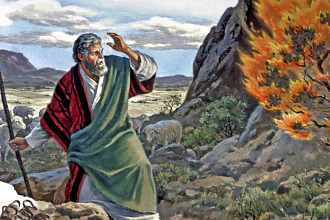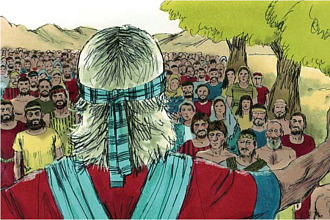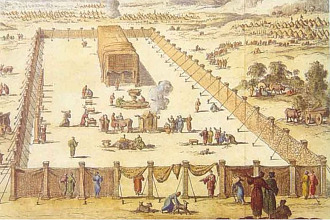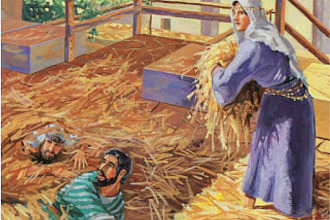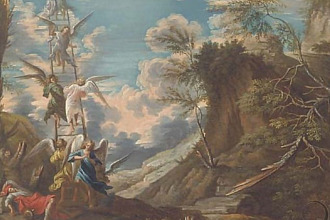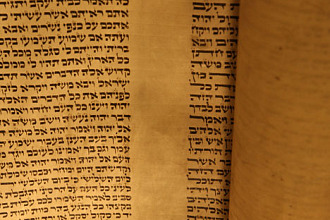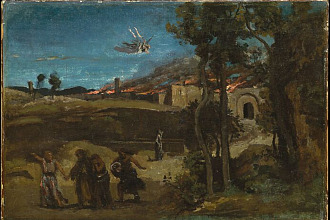Parasha for the Week: Shoftim Deuteronomy 16:18 - 21:9
Haftara for the Week: Isaiah 51:12 - 52:12
Besorat Yeshua: Mark 7:9 - 23
Overview
Moshe tells Bnei Yisrael to appoint judges and officers in their cities.
A bribe of even an insignificant sum is forbidden. Trees are not to be planted near
Hashem's altar, as was the way of idolaters.
Blemishes in animals designated for offerings and other points of disqualification are listed.
The Great Sanhedrin is to make binding decisions on new situations according to Torah criteria to prevent the fragmentation of the Torah.
A very learned scholar who refuses to accept the Halachic incurs the death penalty.
A Jewish king may only have possessions and symbols of power commensurate with the honor of his office, but not for self-aggrandizement. He is to write for himself two sifrei Torah, one to be kept with him wherever he goes, so that he doesn't become haughty.
Neither the kohanim nor the levi'im are to inherit land in the Land of Israel, rather they are to be supported by the community by a system of tithes.
All divination is prohibited.
Hashem promises the Jewish People that He will send them prophets to guide them, and Moshe explains how a genuine prophet may be distinguished from a false one.
Cities of refuge are to be provided an accidental killer to escape the blood-avenger from the deceased's family. However, someone who kills with malice is to be handed over to the blood-avenger. Moshe cautions
Bnei Yisrael not to move boundary markers to increase their property.
Two witnesses who conspire to "frame" a third party are to be punished with the very same punishment that they conspired to bring upon the innocent party.
A kohen is to be anointed specifically for when Israel goes to war, to instill trust in Hashem.
Among those disqualified from going to war is anyone who has built a new house but not lived in it yet, or anyone who is fearful or fainthearted.
An enemy must be given a chance to make peace, if they refuse, all the males are to be killed.
Fruit trees are to be preserved and not cut down during the siege.
If a corpse is found between cities, the elders of the nearest city must take a heifer, slaughter it, and wash their hands over it, saying that they are not guilty of the death.
"A Sacred Stone "
The Torah states: "Do not erect a 'matzaivah' (a pillar of one stone upon which to bring an offering)." (Deut. 16:22) Rabbi Tzvi Elimelech Shapiro of Dinov com¬mented: There are people who are rigid and in¬flexible. They have certain habits and customs and are unwilling to deviate from them. How¬ever, this is a mistake. This day is not similar to any previous day, and no two situations are exactly alike. What is the right thing to do in any situation is dependent on all the unique circumstance of that situation. This can be un-derstood from our verse. Do not erect a way that is rigid or stubbornly unbending regard-less of the situation ('matzav' - which has the same root as 'matzaivah' - means 'situation'). Rather, you should always take action accord¬ing to the needs of that particular moment. A person who does things compulsively with¬out wisdom will make many mistakes. Only someone who has a grasp of the full panoramic view of Torah principles will have the neces¬sary wisdom to judge what is the correct thing to do in every situation. The more Torah you learn the greater will be your ability to make distinctions between different situations.
"Trust in God"
The Torah states: "You shall (trust) wholeheartedly in the Almighty, your God." (Deut. 18:13).
Having trust in the Almighty will give a person peace of mind and seren¬ity. However, one should never use a claim of trust in the Almighty to con¬done laziness or rash behavior. There is a thin line between the virtue of trusting in God and the fault of carelessness and lack of taking responsibility.
The story is told of a man who lived by a river. A policeman warns him to evacuate because of a flood warning. The man rejects the offer and says, "I have perfect trust in the Almighty to save me." As the water rises, a person in a boat offers to take him to safety. The man again replies with his proclamation of trust and refuses the ride. Finally, as the man is sitting on his roof, a helicopter comes to rescue him; again the man proclaims his trust and refuses the rescue. The water rises, the man drowns and is finally standing in judgment before the Almighty. "God, I had perfect trust in you - how could you let me down?" The Almighty replies, "But, my son, I sent the policeman, the boat and the heli-copter!"
"The Hidden Treasure"
Yeshua said that: "The kingdom of heaven is like treasure hidden in a field. When a man found it, he hid it again, and then in his joy went and sold all he had and bought that field. "Again, the kingdom of heaven is like a merchant looking for fine pearls. When he found one of great value, he went away and sold everything he had and bought it." (Matthew 13:44-46). Every believer is able to find the hidden treasurer. "Yeshualooked at him and loved him. "One thing you lack," he said. "Go, sell everything you have and give to the poor, and you will have treasure in heaven. Then come, follow me." (Mark 10:21).
HAFTARA 51:12 - 52:12
Tish'a Be'Av is behind us, we continue to read texts of comfort called in Hebrew "Shiva D'nechemta". Our consolation this week is Is. 51: 12 to Is. 52:12. "For this is what the LORD says: "You were sold for nothing, and without money you will be redeemed." (Is. 52:3).
Parasha: The Word of the Lord, the "Good News" will come to Israel through a prophet like Moses, "I will raise up for them a prophet like you from among their brothers; I will put my words in his mouth, and he will tell them everything I command him." (Deut. 18:18).
Haftara: There is a blessing for anyone who bring a good news to the people: "How beautiful on the mountains are the feet of those who bring good news, who proclaim peace, who bring good tidings, who proclaim salvation, who say to Zion, "Your God reigns!" (Isaiah 52:7). In the context of Isaiah the "Good News" is the good news of Salvation what we call the Besorah.
Parasha: The God of Israel is not a God who is very far and inaccessible or distant, "the LORD your God is the one who goes with you to fight for you against your enemies to give you victory " (Deuteronomy 20:4) The Lord of Israel is near to his people, he loves his people and each one of us. In difficult time he fights for us and gives us victory over our enemies. It is so reachable that one day he came to walk on the streets of Jerusalem.
Haftara: There is a wonderful prophecy in this text. "Listen! Your watchmen lift up their voices; together they shout for joy. When the LORD returns to Zion, they will see it with their own eyes." (Isaiah 52:8). The Lord will come to Jerusalem, he will walk on the streets of Jerusalem and "they [Israel] will see it with their own eyes". Israel has seen it two thousand years ago when Yeshua came to Jerusalem and walked on the streets of Jerusalem. "Awake, awake, O Zion, clothe yourself with strength. Put on your garments of splendor, O Jerusalem, the holy city." (Isaiah 52:1)
Besorat Yeshua Mark 7:9 - 23
Parasha: This parasha is read at the beginning of Ellul, the last month of the year, just before the feasts of Rosh Hashana, Kippur and Succoth. During all the month of Ellul the Jewish people follow some traditions that could become more important than the law of God. Moses said to Israel: "Follow all these laws I command you today — to love the LORD your God and to walk always in his ways" (Deuteronomy 19:9)
Besora: Yeshua confirms what Moses said and insists on the commandments more than the tradition, Israel must follow the commandments of God not the tradition: "You have a fine way of setting aside the commands of God in order to observe your own traditions!" (Mark 7:9)
Parasha: Righteousness and justice are the important points of this parasha; "Righteousness, Righteousness shall you pursue, so that you will live and possess the Land that the Almighty your God, gives you" (Deuteronomy 16:20).
Besora: Yeshua knows that Righteousness and justice come from the heart of man: "Nothing outside a man can make him 'unclean' by going into him. Rather, it is what comes out of a man that makes him 'unclean.'" (Mark 7:1) Yeshua's talmidim did not understand this sentence of Yeshua, he explained: "He went on: "What comes out of a man is what makes him 'unclean.' For from within, out of men's hearts, come evil thoughts, sexual immorality, theft, murder, adultery, greed, malice, deceit, lewdness, envy, slander, arrogance and folly. All these evils come from inside and make a man 'unclean.'" (Mark 7:20-23)
Parasha: Righteousness and justice must be the objective of the judges and tribunal: "One witness is not enough to convict a man accused of any crime or offense he may have committed"




